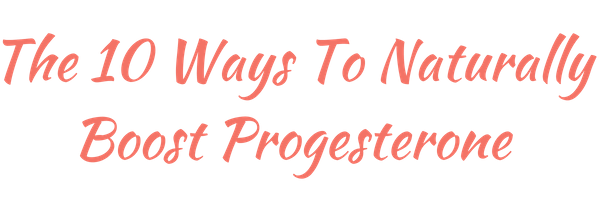10 Natural Ways To Boost Progesterone
Your hormones can easily become thrown out of kilter during menopause bringing about a shower of tiresome symptoms.
Today, we’ll be exploring the role of progesterone during menopause and looking at some natural ways to boost the levels of this hormone without medication.
First things first – what is progesterone?
What Is Progesterone?
Progesterone is a sex hormone produced in the ovaries, adrenal glands and in the placenta when a woman gets pregnant. (1)
This hormone also helps to regulate your monthly menstrual cycle. Levels of the hormone peak during the second half of the cycle post-menstruation. (2)
It’s no surprise, then, that during menopause when your periods have stopped, levels of progesterone fall. (3)

Why Your Body Needs It
It sometimes seems you can’t win as a woman…
High progesterone levels can be responsible for PMS. Then, when you hit menopause, those progesterone levels drop bringing about a number of other negative effects such as:
- Hot flashes
- Lowered libido
- Depression
- Mood swings
- Anxiety
- Weight gain
As you’ll see, these are some of the most common menopausal symptoms so the role of progesterone shouldn’t be underestimated.

Sometimes called the hormone of pregnancy, progesterone should work in harmony with estrogen. When levels of progesterone are too low, estrogen dominance (ED) can occur. As well as some unpleasant symptoms like weight gain, fibroids or painful periods, ED has also been linked to breast cancer. (4)
Progesterone is central to fertility and the menstrual cycle helping the fetus to properly develop and assisting with pregnancy running smoothly.
What Are The Functions That Progesterone Controls?
Progesterone is instrumental in the following areas:
- Thyroid function
- Thickening the lining of uterus
- Menstrual cycle
- Pregnancy
- Breast health
- Skin health
When progesterone drops too low, you can experience all sorts of unpleasant side effects from menstrual problems, anxiety and weight gain through to fluid retention, thyroid issues and brain fog. (5)
How can you help to boost the levels of this crucial hormone in your body?

It might be tempting to think that medication is the key but here are 10 natural ways to enhance the progesterone levels in your body…
- Manage Your Stress Levels: Stress triggers the production of cortisol, a stress hormone. It can also cause the kidneys to convert progesterone into cortisol making you even more stressed. Whether it’s meditation, listening to soothing music, reading or writing, keeping your stress levels in check is a great way to stop progesterone levels plummeting. (6)
- Use a Natural Progesterone Cream: The progesterone used in natural creams can help to balance out levels of estrogen and progesterone in your body. (7)
- Exercise But In Moderation: While exercise is a fundamental part of overall health, overdoing it can cause your body to produce stress hormones rather than progesterone. Keep your exercise regime within reasonable limits if you’re concerned about progesterone imbalance. (8)
- Keep Your Weight Down: Weight gain can make your body kick out more estrogen. By correlation, this leads to the equilibrium with progesterone being disturbed. Sticking to a healthy weight won’t, strictly speaking, boost progesterone but it will work wonders for hormonal balance. (9)
- Magnesium: Magnesium helps to increase progesterone levels and also promotes hormonal balance. Whether you want some spinach or leafy greens, whole grain cereal or nuts, take on board plenty of food rich in magnesium.
- Zinc: This mineral encourages the release of follicle-stimulating hormones. These sex hormones instruct your ovaries to produce more progesterone just in case you fall pregnant. Oysters and prawns are both rich in zinc. If you prefer meat, shoot for some beef, liver or lamb. (10)
- Vitamin B6: Since the B vitamins can help your liver to break down by-products containing estrogen, taking vitamin B6 on board can reduce estrogen dominance while also boosting the production of progesterone. (11)
- Vitamin C: Vitamin C can directly help to increase levels of progesterone. Get some broccoli, sprouts and tomatoes down you. Strawberries and oranges are also laden with vitamin C. If you don’t enjoy these foods, consider a vitamin C supplement. (12)
- Good Cholesterol: Cholesterol gets a bad rap but your body needs some good cholesterol to make pregnenolone. This hormone then helps with the production of progesterone. Try cooking with coconut oil or coconut butter, both sources of good cholesterol. If you eat dairy, eggs and yogurt also work well.
- Eat Enough Fiber: Through regulating bowel movements and consequently helping your body to expel hormones efficiently, a fiber-rich diet is great for hormonal balance. Quinoa and flaxseed are two great ways to increase your fiber intake.
REFERENCES
- http://www.healthywomen.org/condition/progesterone
- https://www.ncbi.nlm.nih.gov/pubmed/21401635
- https://www.ncbi.nlm.nih.gov/pmc/articles/PMC3197715/
- https://www.hormonesbalance.com/articles/breast-cancer-estrogen-link-risk
- https://www.hormonesbalance.com/articles/10-natural-ways-to-boost-progesterone-balance-hormones/
- https://www.hormonesbalance.com/articles/10-natural-ways-to-boost-progesterone-balance-hormones/
- https://www.ncbi.nlm.nih.gov/pubmed/11235062
- https://www.healthline.com/health/natural-progesterone#other-ways
- https://www.ncbi.nlm.nih.gov/pmc/articles/PMC2889220/
- http://healthyeating.sfgate.com/role-zinc-sex-hormones-10196.html
- https://www.ncbi.nlm.nih.gov/pubmed/6684167
- http://www.fertstert.org/article/S0015-0282(03)00657-5/fulltext



